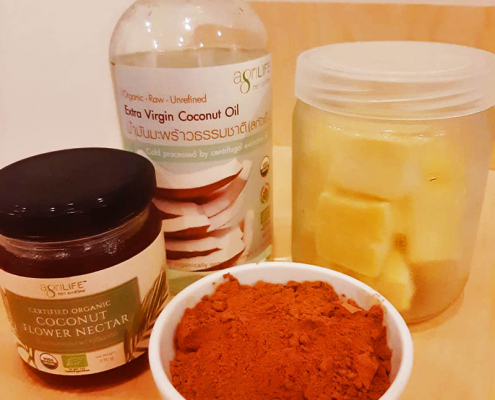 https://samahitaretreat.com/wp-content/uploads/2020/05/chef-mung-bean-SS.jpg
520
1000
Sarah Pierroz
http://samahitaretreat.com/wp-content/uploads/2024/01/samahita-logo-v2.svg
Sarah Pierroz2020-05-06 04:54:412024-02-15 09:35:21Recipe: Mung Bean Falafel
https://samahitaretreat.com/wp-content/uploads/2020/05/chef-mung-bean-SS.jpg
520
1000
Sarah Pierroz
http://samahitaretreat.com/wp-content/uploads/2024/01/samahita-logo-v2.svg
Sarah Pierroz2020-05-06 04:54:412024-02-15 09:35:21Recipe: Mung Bean FalafelHow to Make Healthy Chocolate
4 Ingredients to make Healthy Chocolate
Who doesn’t like chocolate? Despite been utterly delicious it’s also a popular health food. However, not all chocolates are created equally. Some are full of sugar, unhealthy fats, additives and artificial flavorings. To ensure you’re getting the health benefits from your chocolate, make your own with this simple recipe.
To ensure you’re getting the health benefits from your chocolate, make your own with this simple recipe.
Dark Chocolate Recipe
- ½ cup organic cocoa butter
- ½ cup extra virgin coconut oil
- ½ cup organic raw cacao powder
- 2 tablespoons organic coconut flower syrup *optional sweetener
Mix all ingredients in a bowl until it becomes thick and smooth.
Pour into chocolate molds and put in fridge to set.
*Healthy ingredients to add for variety
- cinnamon
- sea salt
- ground nuts
- chopped goji berries
- chopped chilli
Enjoy one or two small pieces, preferable not at night as theobromine that is found in cacao increases the heart rate and can cause sleeplessness.
Vitamins and minerals found in dark chocolate include;
- Manganese – helps activate many enzymes in metabolism. Aids in protein and amino acid digestion and utilization as well as the metabolism of cholesterol and carbohydrates.
- Copper – together with iron, copper enables the body to form red blood cells. It helps to maintain healthy bones, blood vessels, nerves, and immune function, and it contributes to iron absorption.
Iron – is vital to the proper function of hemoglobin, a protein needed to transport oxygen in the blood. - Magnesium – is important for many processes in the body, including regulating muscle and nerve function, blood sugar levels, and blood pressure and making protein, bone and DNA.
- Phosphorus – the main function is in the formation of bones and teeth. It plays an important role in how the body uses carbohydrates and fats.
- Potassium – helps to regulate fluid balance, muscle contractions and nerve signals.
- Zinc – helps the immune system fight off invading bacteria and viruses.
- Vitamin K – refers to a group of fat-soluble vitamins that play a role in blood clotting, bone metabolism, and regulating blood calcium levels.
- Selenium – important for reproduction, thyroid gland function, DNA production and protecting the body from damage caused by free radicals and from infection.
- Calcium – helping to build and maintain strong bones and healthy communication between the brain and other parts of the body.
More from the Samahita Blog







